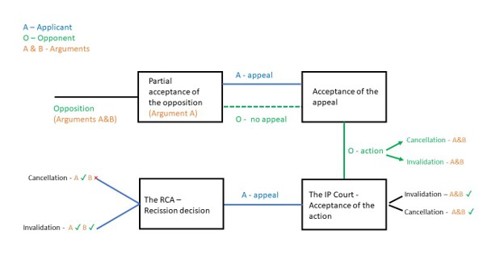Is Partial Victory a Real Victory?
In 2022, the Ankara Regional Court of Appeal (“the RCA”) rendered a decision for an appeal regarding a cancellation action against the Turkish Patent and Trademark Office’s ( “the Office”) decision. Based on this decision, it is concluded that if an argument is rejected during the opposition proceedings before the Office and no appeal is filed against the non-acceptance of this argument before the Higher Board of the Office (even though the decision is in favour of the opponent), the IP Court should not consider it for cancellation claim.
In the case subject to the RCA’s decision, the discussion is that, an opposition against publication before the Office was partially accepted by the Trademarks Department (“the TD”) based on one of the arguments alleged and no further appeal was filed by the opponent against refusal of other arguments before the Higher Board of the Office. However, upon the applicant’s appeal, the Higher Board of the Office reversed TD’s decision. The opponent filed an action against the Office’s decision and requested (i) cancellation of the Office’s decision, (ii) partial invalidation of the contested trademark relying upon all the arguments (which were likelihood of confusion and well-known status) that were asserted initially in the opposition petition.
In the Court Proceedings, the IP Court accepted the case for both grounds. However, the RCA determined that the IP Court’s decision was incorrect as no appeal was filed by the plaintiff/opponent before the Office against the non-acceptance of the well-known status argument by the TD, so the IP Court should have considered that argument only for invalidation claim instead of the cancellation claim of the Office’s decision. The case was sent back to the IP Court after the RCA’s procedural recission decision and the proceedings were continued in line with the RCA’s decision.

The Courts’ interpretation raises a question of whether the opponent will have to appeal anyway if one of its arguments has not been accepted in order to secure that it will be taken into consideration at the (probable/possible) Court action stage, even if the decision given by the Office is favourable (so the goods/services are removed). In other words, this assessment reveals that if one of the arguments has not been accepted, the question of whether the opponent would have to appeal or not a decision is essential.
It should also be noted that the practices of the Courts and the Office are not harmonised. If one of the opposing arguments is accepted, the Office rejects appeals filed before the Higher Board against rejection of other arguments due to lack of interest. Indeed, as per the Office’s point of view, there is no necessity to/importance in examination of the appeal for the refused arguments since the application is already rejected. Furthermore, in cases where more than one opposition is filed against the application and the application is rejected in line with one of those oppositions, , the Office does not examine appeals filed against the rejection of an opposition in their essence and rejects them procedurally similarly since there is no benefit, which are filed by the other opponents whose oppositions were rejected since it states that the application is ultimately rejected (even due to the opposition of a third party). In this context, if the point of view that an argument will not be taken into consideration at the trial since it was not brought before the Higher Board will take roots, the Office would be expected to change its implementation.
If the RCA’s controversial approach becomes a general practice, we fear that it would create unnecessary appeals and court proceedings, which create an adverse impact on enforceability and consistency between administrative and court decisions while seriously increasing the workload in each step.
Despite such adverse impacts, every case should be examined in its conditions, and a strong strategy must be built to decide on the importance of entering into appeal/court proceedings for rejection of one (crucial) argument – even if the opposition was successful .

